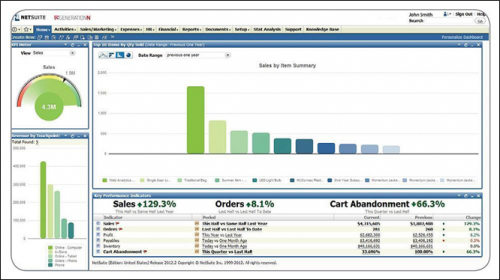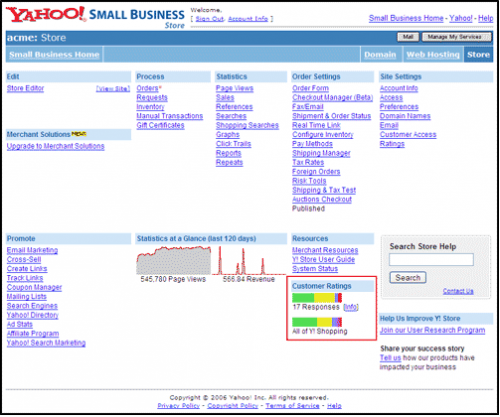Shopify vs NetSuite vs Yahoo Store: It’s like comparing apples to oranges to pogo sticks, but nevertheless, let’s take a look at these different ecommerce solutions and try to come up with the ultimate shopping cart provider for you. After all, if you dream of taking over CyberSpace with your truly one-of-a-kind product or service, you need to invest in the kind of shopping cart engine that will enable you to realize your potential without squandering all of your capital on digital overhead. As a Web entrepreneur myself, I completely understand. I have used all of these services extensively, so I’ll try to be as thorough as possible when it comes to judging between Shopify vs NetSuite vs Yahoo Store.
Shopify
Shopify has been around for nearly 10 years, and it’s easily one of the most popular eCommerce solutions on the market, with more than 70,000 online retailers currently under its digital umbrella. It has been praised by major tech empires like CNET and was named Ottawa’s Fastest Growing Company by the Ottawa Business Journal in 2010. Clearly you could do a lot worse when it comes to building your online store, but is it the ultimate solution?
The Pros: One of the biggest advantages of Shopify is the price. You can get started for as little as $14 a month, and the features are quite impressive. In fact, for as little $29 a month, you can enjoy unlimited bandwidth, and not many eCommerce providers offer such expansive capabilities for such a small price tag. Shopify charges no transaction fees (when you use Shopify Payments), and the engine is remarkably easy to use, which makes it perfect for the novice Web developer, and for the everyday business owner who just wants to build a quality store without drowning in a sea of complicated code.
The Cons: The biggest flaw is in the customization. Unless you’re familiar with the Liquid programming language, your customization options are going to be extremely limited. If you pride yourself a developing rock star who loves to manipulate all of the subtle aspects of your online storefront, you might find Shopify to be more trouble than it’s worth. Even after a decade in business, Shopify appears to be more geared toward the amateur store owner, with few accommodations that would satisfy serious developers.
NetSuite
NetSuite actually encompasses a series of programs that address every major facet of online business, from financial accounting to cloud computing. But if we’re comparing like vs. like, we’re going to focus on SuiteCommerce, the eCommerce platform that allows you to build and manage your store within the NetSuite framework. NetSuite is one of the most trusted business platforms that you’ll find, and SuiteCommerce has quite a few tricks up its sleeve.
The Pros: SuiteCommerce really is a force to be reckoned with. Rather than focusing simply on the day-to-day operations associated with designing and maintaining a business website, it takes things to the next level and integrates all of the functions that keep successful businesses afloat. It integrates seamlessly with all of the award-winning NetSuite systems, enabling you to manage every aspect of your business with ease, from the technical to the visual to the financial to the marketing.
The Cons: If you’re looking for a cost-effective ecommerce solution, just keep looking. SuiteCommerce is hands down one of the most costly platforms on the market, and while it definitely boasts some impressive features, I’m not sure that the added bells and whistles are worth the exorbitant price tag. Nevertheless, if you’re looking for a platform that functions as a fully equipped digital workforce right of out of the box, and you have the budget to make it worthwhile, you may want to consider how NetSuite can work for you.
Yahoo Merchant Stores
Yahoo is much newer to the shopping cart game, but it definitely boasts some impressive features that are worth noting. According to the Yahoo Merchant website, “More Internet Retailer® Top 500 retailers use Yahoo than any other hosted solution,” and the format has undoubtedly made an impressive name for itself. But does it measure up? It really depends on what you’re looking for.
The Pros: One of the most notable benefits is the online payment system. Most eCommerce solutions will require you to choose a third-party merchant and integrate it with your shopping cart account, but Yahoo streamlines the entire process very nicely. Additionally, Yahoo offers some impressive marketing tools, a massive array of apps and extensions, and easy customization. Plans start at only $10.19 a month, so it’s a great platform for getting your feet wet.
The Cons: First and foremost, you need to be aware of the transaction fees. While the price may seem extremely reasonable on the surface, the cost can really add up if you have a high volume of sales. You’re looking at a transaction fee of 1.5% per purchase, so be aware of how this may impact your bottom line. Another major setback is the customer service. While most established eCommerce providers offer 24/7 customer support, Yahoo can only be contacted between Monday through Friday between the hours of 7 a.m. and 5 p.m. Pacific time, so heaven help you if your site crashes on a Friday night.
Shopify vs NetSuite vs Yahoo Store – Choosing the Best Solution
Ultimately, each of these providers will get the job done. Choosing the best platform between Shopify vs NetSuite vs Yahoo Store is about assessing your needs and weighing the pros and cons accordingly. If you need help making the right decision, or if you’re looking to make your chosen eCommerce provider work for you like never before, I would encourage you to contact my design and development company, Coalition Technologies, for an expert analysis. We’ll give you a free quote and let you know how we can help you to reach your true potential. Call us at 1-888-800-9101 today.


